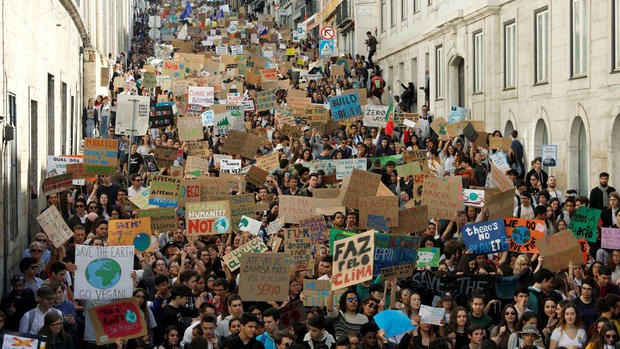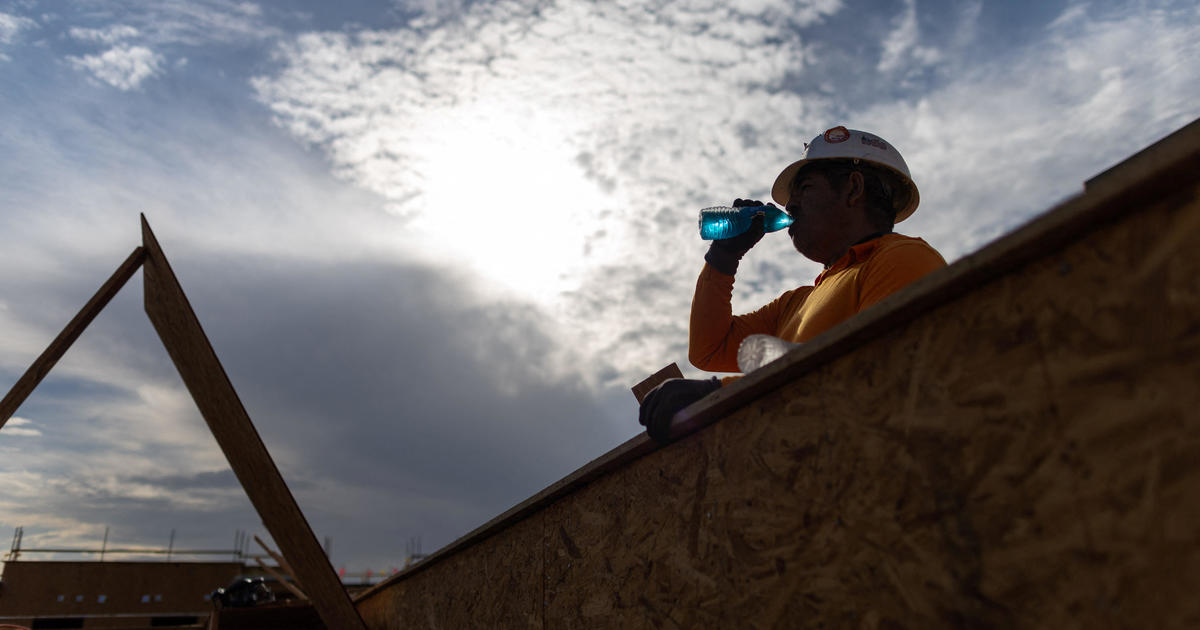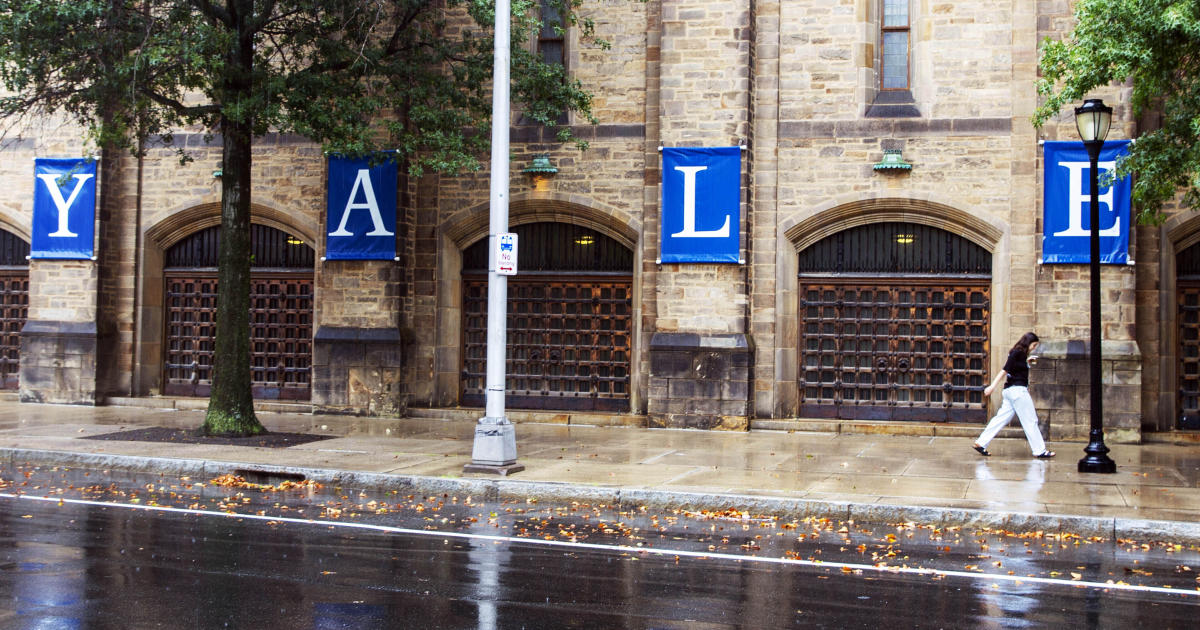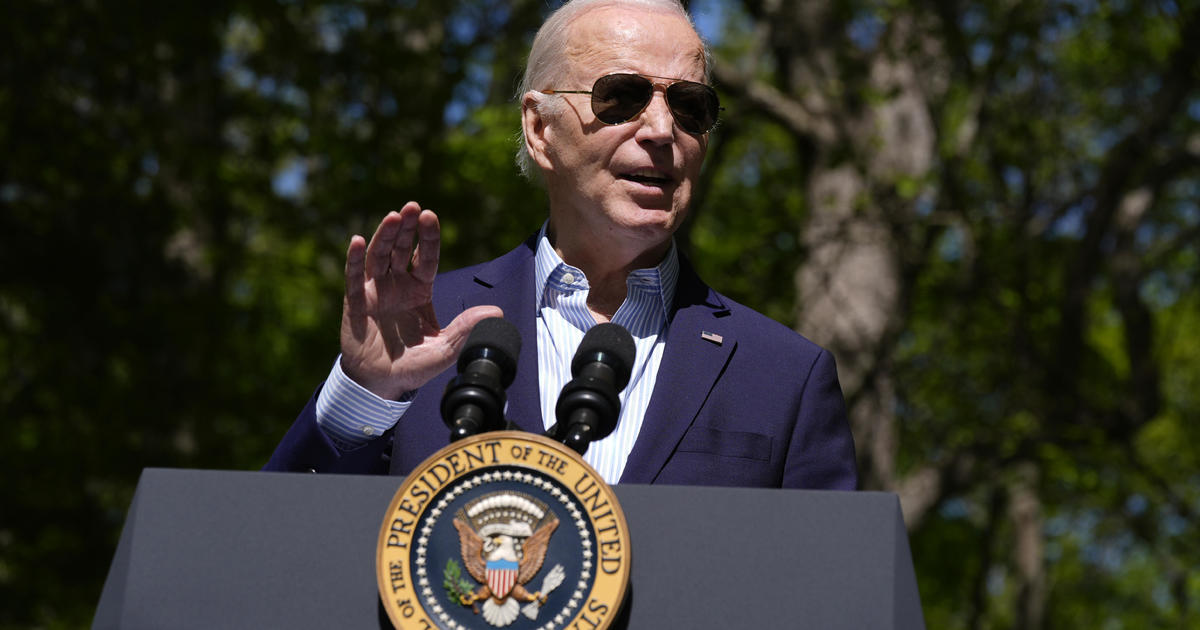Students worldwide skip school to demand tough action on climate change
From the South Pacific to the edge of the Arctic Circle, students mobilized by social media and word of mouth skipped class Friday to protest what they believe are their governments' failure to take tough action against global warming. The rallies were one of the biggest international actions yet, involving hundreds of thousands of students in more than 100 countries around the globe.
The coordinated "school strikes" were inspired by 16-year-old Swedish activist Greta Thunberg, who began holding solitary demonstrations outside the Swedish parliament last year. Since then, the weekly protests have snowballed from a handful of cities to hundreds, fueled by dramatic headlines about the impact of climate change during the students' lifetime.
Thunberg, who was recently nominated for the Nobel Peace Prize, said as protesters cheered her name at a rally in Stockholm that the world faces an "existential crisis, the biggest crisis humanity ever has faced, and still it has been ignored for decades by those that have known about it. And you know who you are, you that have ignored this and are most guilty of this."
Across the globe, protests big and small urged politicians to act against climate change while also highlighting local environmental problems.
- Speakers at the U.S. Capitol in Washington stood behind a banner that said "We don't want to die."
- In New York City, students chanted "Save our planet" and "Climate change has got to go" near an entrance to Central Park.
- In San Francisco, hundreds of students disrupted downtown traffic as they marched from House Speaker Nancy Pelosi's office to Sen. Dianne Feinstein's office, CBS San Francisco reported.
- In St. Paul, Minnesota, about 1,000 students gathered before the state Capitol, chanting "Stop denying the earth is dying."
- In Berlin, police said as many as 20,000 protesters, most of them young students, gathered in a downtown square, waving signs with slogans such as "March now or swim later" and "Climate Protection Report Card: F" before marching through the capital's government quarter with a stop in front of Chancellor Angela Merkel's office.
- In Poland, thousands marched in rainy Warsaw and other cities to demand a ban on the burning of coal, which is a major source of carbon dioxide. Some wore face masks as they carried banners that read "Today's Air Smells Like the Planet's Last Days" and "Make Love Not CO2."
- In India's capital New Delhi, schoolchildren protested inaction on climate change and rising air pollution levels that often far exceeds World Health Organization limits.
- "Now or Never" was among signs brandished by enthusiastic teenagers thronging cobblestoned streets around the domed Pantheon building, which rises above the Left Bank in Paris. Several thousand students gathered peacefully around the landmark. Some targeted French President Emmanuel Macron, who sees himself as the guarantor of the Paris climate accord but is criticized by activists for being too business friendly and not ambitious enough in efforts to reduce French emissions.
- About 50 students protested in South Africa's capital, Pretoria, chanting "There's No Planet B." One protester held a sign reading "You'll Miss The Rains Down in Africa." Experts say Africa, with its population of more than 1 billion people, is expected to be hardest hit by global warming even though it contributes least to the greenhouse gas emissions that cause it.
- Police in Vienna said about 10,000 students rallied in the Austrian capital, while in neighboring Switzerland a similar number protested in the western city of Lausanne. Last month, lawmakers in the northern Swiss canton of Basel symbolically declared a "climate emergency."
- In Helsinki, police said about 3,000 students had gathered in front of Finland's Parliament sporting placards such as: "Dinosaurs thought they had time too!"
- Thousands marched through Madrid and more than 50 other Spanish cities. Spain is vulnerable to rising sea levels and rapid desertification.
A website used to coordinate the rallies listed events in over 2,000 cities. In the U.S., Alexandria Villasenor founded Youth Climate Strike U.S. along with 12-year-old Haven Coleman and 16-year-old Isra Hirsi.
They're calling for, among other things, "100 percent renewable energy by 2030," CBS News correspondent Tony Dokoupil reported. For more than three months, Villasenor has been playing hooky from the 7th grade on Fridays and going to U.N. headquarters in New York in hopes of pushing adults into action against global warming.
"Since climate change will be a global problem, I decided that this would be the best place to strike," she told CBS News. She expected students to be striking in all 50 states Friday.
In a speech Friday outside the U.N., Villasenor said world leaders weren't listening. "Our world leaders are the ones acting like children," she said. "They are the ones having tantrums, arguing with each other and refusing to take responsibility for their actions while the planet burns."
Later, U.N. Secretary-General Antonio Guterres said he was inspired by the students to call a special summit in September to deal with what he called "the climate emergency." "My generation has failed to respond properly to the dramatic challenge of climate change," Guterres wrote in an opinion piece in The Guardian. "This is deeply felt by young people. No wonder they are angry."
Danish Prime Minister Lars Loekke Rasmussen showed up at a protest in Copenhagen and tweeted Friday "We must listen to the youth. Especially when they're right: the climate must be one of our top priorities."
Carla Reemtsma, a 20-year-old university student who helped organize the protest in Berlin, said she's part of about 50 WhatsApp groups devoted to discussing climate change. "A lot happens on social media because you can reach a lot of young people very quickly and show them: look there's lot of us," she told the Associated Press. "There's a very low threshold so we reach a huge number of people."
"I think that's how we managed to get so big," said Reemtsma. Many protesters in Berlin took aim at politicians such as the leader of Germany's pro-business Free Democratic Party, Christian Lindner, for suggesting that complicated issues such as climate change were "a matter for professionals" not students.
Others, including Germany's economy minister, Peter Altmaier, have urged students to stage the protests outside school hours.
Volker Quaschning, a professor of engineering at Berlin's University of Applied Sciences, said it was easy for politicians to belittle students. "That's why they need our support," he said. "If we do nothing then parts of this planet could become uninhabitable by the end of the century."
Scientists have backed the protests, with thousands signing petitions in support of the students in Britain, Finland, Germany and the U.S. "It gives me great hope," environmentalist Bill McKibben told CBS News contributing meteorologist Jeff Berardelli. "This new generation is doing all it can to make sure that we older people don't foreclose their chance for a decent life. It's beautiful to see their courage, their passion -- if anyone ever thought 'kids today' don't care about the world, or are spending all their time on video games, the photos from around the world should renew their faith."
Scientists have warned for decades that current levels of greenhouse gas emissions are unsustainable, so far with little effect. In 2015, world leaders agreed in Paris to a goal of keeping the Earth's global temperature rise by the end of the century well below 2 degrees Celsius (3.6 degrees Fahrenheit).
Yet at present, the world is on track for an increase of 4 degrees Celsius, which experts said would have far-reaching consequences for life on the planet. In Germany, environmental groups and experts have attacked government plans to continue using coal and natural gas for decades to come.
Quaschning, who was one of more than 23,000 German-speaking scientists to sign a letter of support this week, said Germany should aim to fully "decarbonize" by 2040. This would give less-advanced nations a bit more time to wean themselves off fossil fuels while still meeting the Paris goal globally.
"This is going to require radical measures and there isn't the slightest sign of that happening yet," said Quaschning.
A poll published Friday by German public broadcaster ZDF found that 67 percent of respondents backed the students' protests during school hours, with 32 percent opposed. The representative telephone poll conducted between March 12 and 14 involved 1,290 randomly selected voters. The margin of error was about 3 percentage points.
In Stockholm, Greta Thunberg predicted that students won't let up their protests. "There are a crisis in front of us that we have to live with, that we will have to live with for all our lives, our children, our grandchildren and all future generations," she said.
"We won't accept that, we won't let that happen and that's why we go on strike. We are on strike because we do want a future, we will carry on," she said.




